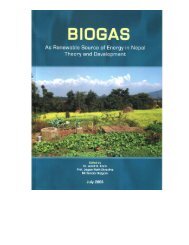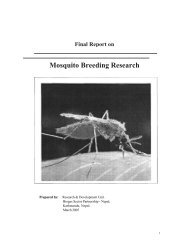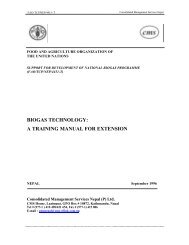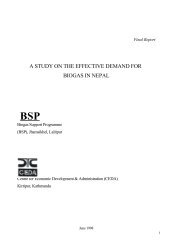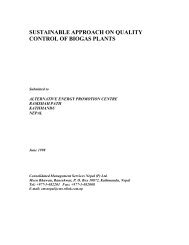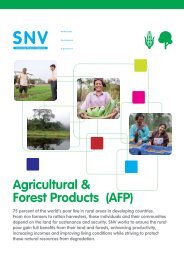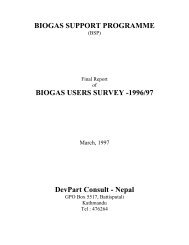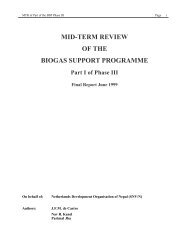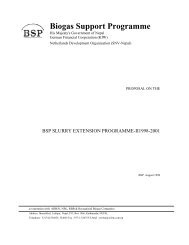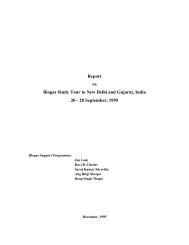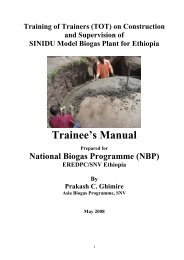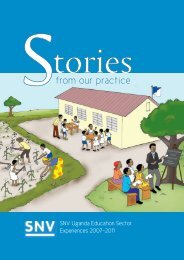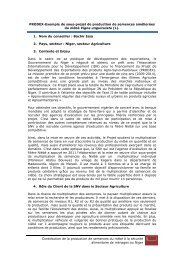download (pdf, 252kB) - SNV
download (pdf, 252kB) - SNV
download (pdf, 252kB) - SNV
Create successful ePaper yourself
Turn your PDF publications into a flip-book with our unique Google optimized e-Paper software.
CASE STUDY 81<br />
Community health insurance (CHI) and the food crisis:<br />
response from the village of Badaguichiri, Niger<br />
Authors/ Advisor Names: Kimba Amadou<br />
Country & Sector: Niger, Health<br />
Context<br />
A nationwide survey conducted in Niger in April 2010 on rural and urban<br />
household vulnerability to food insecurity revealed that the most affected zones<br />
and the people most in need of aid are located in the regions of Maradi (29.3%),<br />
Tahoua (24.5%) and Tillabéry (24%). The most dire circumstances are in the<br />
Department of Illéla, in particular, in a number of villages in the Badaguichiri zone<br />
(all in the Tahoua region).<br />
This situation has been harmful to local operations, especially in the ability of<br />
local organisations to fund their work. Community Health Insurance (CHI) in<br />
particular has suffered financial setbacks. For example, in Badaguichiri, a number<br />
of heads of households, members of the CHI, were unable to pay both grain<br />
staples for their homes and the monthly fee towards CHI operations. The food<br />
crisis thus produces a drop in the payment of membership fees, and as a<br />
consequence forms a menace to the sharing of risks in the villages during this<br />
precarious period.<br />
Client<br />
Since the launching of the CHI in 2009 with <strong>SNV</strong> support, numerous supervised<br />
activities have taken place ranging from the implementation of members‟ groups<br />
to management training and other types of technical support for the manager and<br />
the board, all aimed at assisting them in doing their job well. Everything was<br />
made possible by the support of a local LCB and the village itself. This<br />
collaborative process involving the main actors (CHI, village, LCB), relying on a<br />
progressive transfer of skills, illustrates the degree of inclusion and ownership<br />
central to <strong>SNV</strong>‟s intervention strategy.<br />
The decentralisation law stipulates that rural towns should be in charge of all<br />
aspects of local development. This perspective shaped <strong>SNV</strong>‟s choice of<br />
Badaguichiri as the main client of <strong>SNV</strong> Tahoua. In accordance with the activities<br />
contract signed in 2010, <strong>SNV</strong> is supervising the village of Badaguichiri in a<br />
process of capacity reinforcement.<br />
The CHI being a structure implemented under the tutelage of the village, it also<br />
stands to benefit from <strong>SNV</strong> support offered to all participatory community bodies.<br />
The main ones to consider are COSAN (health committee) and COGES¹<br />
(management committee), as well as health services related to CSI (integrated<br />
health centres) and small dispensaries (cases de santé).<br />
Intervention logic and methods<br />
<strong>SNV</strong>‟s work with Badaguichiri took off in 2007. The choice of this village as client<br />
was motivated by the towns‟s role as an economic crossroads, partly due to its<br />
agro-economic potential but above all because of its well-known livestock market.<br />
<strong>SNV</strong>‟s support for decentralisation during the period 2005-2008 has allowed the<br />
village to reap the benefits of this support in terms of performance, with both<br />
local officials and the village itself, functioning as a decentralised entity,<br />
capitalising on the experience.<br />
___________________________<br />
<strong>SNV</strong> Netherlands Development Organisation 84 Case Studies 2010
1 As its executive branch, the management committee at COSAN reports back to COSAN‟s GA.<br />
In conjunction with the CHI‟s launching of health services in January 2009, the<br />
main activities covered by the plan in the 2010 contract signed by the village and<br />
<strong>SNV</strong> include organisational and institutional reinforcement, social mobilisation and<br />
administrative and financial management.<br />
In 2010, <strong>SNV</strong> and the key actors (the village, the CHI, COGES and CSI)<br />
collaborated on organising ToR‟s (Terms of Reference) in the interest of carrying<br />
out “Sensitivity Sessions” with the principal goal reviving CHI operations.<br />
It had been determined that the activity would be carried out with the support of<br />
an LCB. With an LCB on board, <strong>SNV</strong> pursued its work of reinforcing management<br />
skills in the sector, in line with the <strong>SNV</strong> strategy of enabling a gradual transfer of<br />
skills to LCB‟s.<br />
Applying the intervention methodology, and working under the supervision of the<br />
<strong>SNV</strong> health adviser, the LCB put forward suggestions on the intervention<br />
methodology. In this fashion a representative team was put together, uniting the<br />
various bodies involved: the CHI (administration adviser, management<br />
committee), traditional leadership (representative of the regional Chief), the<br />
health sector (CSI boss) and the town hall (focal point of health-related<br />
activities).<br />
The LCB organised a preparatory meeting with the aim of harmonising<br />
understanding of the objectives outlined in the ToR‟s and of dividing<br />
responsibilities to ensure coherence during the Sensitivity Sessions.<br />
Each actor‟s role was clearly defined: in all aspects of local development, the<br />
village representative would act as supervisor, while the LCB would serve as<br />
moderator.<br />
During the sensitivity sessions, the CHI members would assess adhesion<br />
principals, remittance circumstances in the target villages and the level of<br />
operations during this period of the food crisis. The traditional leadership<br />
representative would occupy himself with the matters of solidarity and mutual aid<br />
in the community, and the CSI headman would stress to the local population the<br />
importance of utilising health services, especially for women and children. The<br />
latter form the most vulnerable layer during the off-season between harvests,<br />
which coincides with the rainy season when malaria runs rampant, accounting for<br />
up to 85% of reported illnesses.<br />
Considering the importance of this activity with regard to sensitivity towards the<br />
successful workings of the CHI while grappling with the food crisis, the delegated<br />
administrator was invited to the preparatory meetings as a resource person. After<br />
having reviewed the substance of the activities with the village leadership,<br />
various issues were tackled by the LCB and chairman of the management<br />
committee, who in turn elaborated on the influence on and consequences of the<br />
food crisis for the uninterrupted CHI operations. The exchanges highlighted the<br />
latent problem of collecting contributions during the months of June through<br />
September, the off-season.<br />
As an indication of interest in sustaining and making all local development<br />
initiatives durable, the village‟s administrative delegate followed up on the efforts<br />
of his predecessor in deciding to work alongside of the members of the fledgling<br />
CHI in order to face the thorny issue of viability in the context of food insecurity.<br />
The administrative delegate subsequently announced that the town would provide<br />
one-off financial backing to cover CHI expenditures on members to date<br />
throughout the four months of the off-season in Niger (June through September).<br />
<strong>SNV</strong> Netherlands Development Organisation 85 Case Studies 2010
Outcome<br />
Viewed on the whole, the principal result is the fact that the village exercised its<br />
management role for health issues in supporting the CHI from the „health‟ post of<br />
its 2010 budget. The decision to take care of 70% of services provided by CSI,<br />
50% of all prescription costs and the Director‟s salary during the four-month long<br />
off-season (June through September) made it possible for the CHI to recuperate<br />
unpaid fees, catch up on arrears and to register new members. As a result, the<br />
number of members and direct beneficiaries grew from 225 members, with a total<br />
of 1,478 beneficiaries, in January 2010 to 403 members, with a total of 2,491<br />
beneficiaries, in June 2010, signifying a 40.66% increase in the number of people<br />
under their care.<br />
Thanks to the village, 55.83% of CHI members have caught up on their monthly<br />
contribution. The situation concerning fees is as follows: from FCFA 147,800<br />
(Euro 225,3) in January 2010, the total rose to FCFA 225,000 (Euro 342) in June<br />
of the same year.<br />
Data gathered by the CSI health agent for the benefit of the CHI demonstrated<br />
that the rate of use of the health centre by members rose by two points, from<br />
31.43% in the third trimester of 2009 to 34% at the end of April 2010.<br />
CHI management professionalism increases with the capacity to seize<br />
opportunities precisely when their organisation is confronted with difficulties.<br />
Finally, CHI membership demands in two surrounding villages are currently being<br />
assessed by the administrative council.<br />
Impact<br />
A year after the establishment of the CHI with <strong>SNV</strong> support via a local LCB, a<br />
tangible impact has been made by the will on the part of village leaders to make<br />
important decision regarding project ownership, in spite of ineffective skills<br />
transfer within the health sector. This applies above all to the CHI‟s material and<br />
financial supervision with the overall aim of improving basic health guidelines.<br />
This communal decision to cover CHI expenses during the off-season has restored<br />
confidence among those administered to as well as those in charge of the<br />
municipal administration. Above all, the village is better able to anticipate health<br />
sector costs.<br />
Furthermore, the municipality‟s leader set a precedent by allocating part of the<br />
village budget to regular financial support of the CHI.<br />
While anticipating the effectiveness of skills transfer in the health sector, the<br />
village dignitaries understand that their involvement hinges upon respect of<br />
Articles 80 and 81 in the decentralisation law, which stipulates that “skills for<br />
non-hospital primary health care services (CSI and small dispensaries) are the<br />
responsibility of the municipalities”.<br />
Following this success, CHI officials have become more aware of their role in<br />
social mobilisation.<br />
Also important is the interest shown by communities who have come to believe in<br />
this initiative through the respect shown by village authorities towards their<br />
commitments.<br />
Lessons learnt<br />
<strong>SNV</strong> Netherlands Development Organisation 86 Case Studies 2010
- <strong>SNV</strong>‟s 2007-20015 strategy of outlining the gradual transfer of skills to the<br />
grassroots LCB‟s calls for a localised approach.<br />
- The village-<strong>SNV</strong>-LCB partnership and health services must be reinforced with<br />
institutional and organisational supervision for the CHI through activities<br />
related to governance, planning, social mobilisation, partnership, management<br />
and monitoring.<br />
- A permanent consultative framework must be set up, involving the CHI, the<br />
CSI and the village, in order to ensure the viability and durability of the CHI.<br />
Photo and Quotes<br />
„The Sensitivity Sessions have made it possible for us to better understand the<br />
importance of what is at stake when it comes to the CHI. In reality, if there is no<br />
respect for commitments concerning regular payment of the monthly fee, the CHI<br />
cannot cover its costs. Beyond that, this news coming from the municipality makes<br />
us very happy because it demonstrates, in contrast to what critics say, that the<br />
village authorities do care about our welfare.‟ (translated from Hausa/French) The<br />
President of the members‟ group in Sagoumou Kaoura 1, village in the Badaguichri<br />
zone.<br />
Sensitivity Training in Sagoumou Kaoura 1<br />
Additional data‟s<br />
Contract duration: 16-21 May 2010<br />
Team members: Kimba Amadou (<strong>SNV</strong>) – Arzika Harouna (LCB Haské)<br />
Number of PP-days : Staff <strong>SNV</strong>= 3 / LCB = 6<br />
Key partners in the preparation, execution and evaluation of activity :<br />
Badaguichiri village, CHI management committee, health centre<br />
Expenditures: FCFA 395,000.- (€ 602.-)<br />
<strong>SNV</strong> Netherlands Development Organisation 87 Case Studies 2010
Client satisfaction and capacity reinforcement scores<br />
OUTPUT (1= poor, 2=average 3= satisfactory 4=above expectations)<br />
Score<br />
client<br />
Score<br />
<strong>SNV</strong><br />
1. How would you evaluate the quality of our advice ? 3 3<br />
2 What about our approach, style and method of<br />
4 3<br />
communicating with the client ?<br />
3. How do you view with client‟s learning process throughout 3 3<br />
the collaboration with <strong>SNV</strong> ?<br />
4. Did you feel in control of the collaboration with <strong>SNV</strong> ?<br />
1 1<br />
(1=no control 4=very much in control)<br />
5. Is <strong>SNV</strong> service/advice useful and relevant to the outcome ? 4 3<br />
OUTCOME<br />
1. The learning process was :(1= poor, unsatisfactory, 4=process<br />
surpassed expectations<br />
2. To what extent has <strong>SNV</strong> support contributed to the client‟s progress<br />
and learning process ?<br />
(1=progress and learning are not related to <strong>SNV</strong> support<br />
4= <strong>SNV</strong> backing was crucial to progress and learning<br />
Score<br />
client<br />
4<br />
4<br />
<strong>SNV</strong> Netherlands Development Organisation 88 Case Studies 2010



